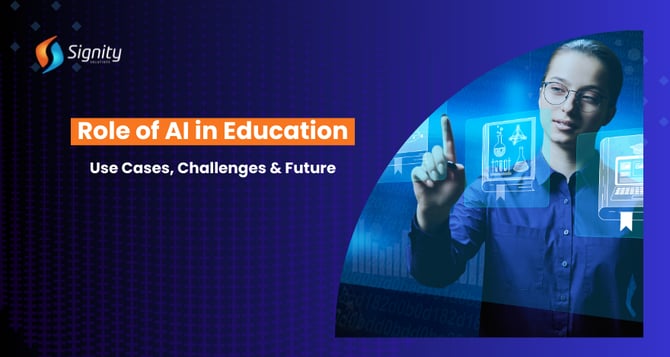Role of AI in Education: Use Cases, Examples, Challenges, and Future
Have you integrated AI practices in your educational institution? AI algorithms help provide the best solutions for students and educators. Check the use cases, real-world examples, challenges, and future prospects of AI in the education sector.

Artificial Intelligence has played a great role in several industries, making the processes easy, fast, and error-free. Similarly, this technology plays a crucial role in the education industry.
From providing customized learning materials to students to enabling educators to make learning interesting, AI helps the education sector in various ways.
Hence, integrating the best AI practices is vital for growth, but each business has unique needs and demands for AI. Collaborating with an AI education development company can help you get just the right solution.
Explore the uses of AI in education, top real-world examples, challenges, and future prospects.
Key Takeaways
- AI supports personalized learning, automates tasks, and improves efficiency for educators and students.
- Tools like Duolingo and Google Classroom showcase AI’s role in creating engaging, tailored learning experiences.
- Data privacy, teacher training, and algorithm bias are key hurdles to address for effective AI integration.
- AI promises adaptive learning, academic integrity tools, and inclusive, engaging education solutions.
Uses of AI in Education
The use of Artificial Intelligence in the education sector has enhanced learning. From personalized content to access to education from anywhere in the world, it is continuously helping the students and teachers likewise.
1. Personalized Learning
One of the major applications of AI in education is its role in providing personalized learning to students. It is the reason why students have already implemented AI in their education. The image below shows that 86% of students use AI for their studies.
Based on students' learning habits, preferences, and progress, AI algorithms provide customized educational content. With technology like ML, it analyzes patterns to predict areas where students might need additional support.
2. Automation of Administrative Tasks
Educators spend plenty of time on administrative tasks and paperwork. Further, manual work can also lead to errors. This is where AI in the education sector comes in. With various AI tools, schools and educational institutions can automate the admin work.
The AI tools automate various tasks like scheduling, grading, and record-keeping to enable educators to focus more on teaching and student engagement. Tools like chatbots and data management systems efficiently handle inquiries and analyze student data, enhancing overall operational efficiency.
3. Automated Grading and Assessment Tools
Another way AI helps in education is by enabling automated grading. Studies have shown that AI-powered grading tools have proven to reduce the time spent on grading assessments by 70%.
The assessment tools not only save valuable time but also provide detailed feedback to streamline the entire process for consistency. These tools also help identify common areas where students need help to help educators focus on those specific areas.
4. Chatbots and Virtual Assistance
Chatbots and virtual assistants are transforming education by providing instant, round-the-clock support to students and educators. These AI-powered tools can answer frequently asked questions, assist with administrative tasks like scheduling or enrollment, and guide students through course material.
By offering personalized interactions, chatbots enhance the learning experience, catering to individual needs and preferences. Virtual assistants also help streamline communication, reducing the workload for educators and freeing up time for more meaningful teaching.
5. Smart Content Creation
Did you know that the smart AI education content market is projected to grow more than 25% CAGR between 2023 and 2032? Content creation through Artificial Intelligence has revolutionized how educational materials are developed.
.png?width=1920&height=1080&name=How%20AI%20Education%20is%20Making%20the%20Industry%20Better%20(2).png)
AI tools help generate dynamic learning content like interactive quizzes, multimedia presentations, and custom content for various learning styles. Content creation further helps educators reduce time spent on manual material preparation.
6. Curriculum Planning
One of the most popular roles of AI in education is curriculum planning. It helps so by analyzing a large amount of data to identify the most effective teaching methods and content for diverse student groups.
Artificial Intelligence evaluates factors like learning objectives, student performance, and evolving industry demands to design tailored curricula. It helps design plans that align with students’s growth.
7. Individualized Learning
AI-driven individualized learning tailors educational experiences to each student's unique needs, pace, and preferences. It analyzes data on learning habits, performance, and areas of difficulty; it creates a personalized lesson plan to suggest resources for an individual's strengths and weaknesses.
Artificial Intelligence's approach helps students progress at their own speed to ensure they fully grasp concepts before moving forward. It also provides real-time feedback and insights to assist students stay motivated and engaged.
8. Predictive Analytics
AI in the education sector plays a crucial role, and reports have shown that 65% of faculty members use AI for predictive analytics. AI algorithms identify patterns and trends to help educators proactively address issues like dropouts or poor academic outcomes.
The data-driven approach empowers institutions to make informed decisions, optimize resources, and create targeted interventions for fostering a more effective and supportive learning environment.
9. Dyslexia Detection
Advanced AI models assess errors and inconsistencies in written or spoken language, providing educators and parents with actionable insights. It analyzes patterns in reading, writing, and speech, helping tools identify signs of dyslexia like difficulty with phonological processing.
Further, early detection allows for personalized learning plans and specialized support, helping students overcome challenges and succeed academically. This approach not only enhances educational outcomes but also boosts confidence and inclusivity in the classroom.
10. Adaptive Learning
Adaptive learning powered by AI creates a customized educational experience that adjusts to each student's individual needs and pace. By continuously analyzing a learner's performance, strengths, and areas for improvement, AI systems dynamically modify content delivery, difficulty levels, and teaching strategies.
It ensures that students spend more time on challenging topics while progressing quickly through familiar material. Adaptive learning keeps students engaged, reduces frustration, and promotes mastery of concepts, all while providing educators with insights to offer targeted support.
Real-World Examples of AI in the Education Sector
As mentioned earlier, the use of Artificial Intelligence in education has made learning and teaching more interactive and easy. Here are some of the great examples of how AI helps in education.
1. Duolingo
Duolingo is a language-learning application and a great example of an AI-based learning platform. It integrates a smart bot to interact with students. Duolingo provides a personalized learning approach that includes an initial positioning test to scan the student’s skills and progressive readjustments.
The platform focuses on making learning fun and accessible for all with features like free language education, premium content, and personalized education.
2. Google Classroom
Another popular example of AI in the education sector is Google Classroom. Designed by Google, it fosters effective communication between educators and students. Google Classroom focuses on simplifying the sharing and delivery of learning resources like assignments, surveys, documents, and more.
Students get quick access to learning materials, whereas teachers can create classes and invite students to the platform.
3. DreamBox
DreamBox Learning is an online platform that focuses on mathematics and reading students. With the integration of innovative technology, it personalizes instructions, allowing students to progress at their own pace. It provides interactive lessons that are designed to foster conceptual understanding.
It leverages real-time data and analytics to empower educators to differentiate instructions and track student progress.
4. Knewton Alta
Knewton Alta is another adaptive learning platform that helps enhance student engagement and academic achievement in higher education. It employs personalized learning paths and real-time analytics to assess individual student progress and adapt content to their unique needs.
Further, students can seamlessly access course materials, including interactive exercises and assessments that adjust in difficulty based on their performance.
Challenges of Artificial Intelligence in Education
One of the many obstacles to integrating AI in education is that in order to utilize the technology fully, teachers and students must be AI literate. AI-powered proctoring systems can improve exam integrity. However, privacy and security issues frequently surface, requiring strong data protection regulations to secure student information.
Along with the development of ethical standards and practices in the use of such technology, bias detection must also be addressed to guarantee that AI tools support fair learning opportunities. The implementation process may be complicated by the need to comply with multiple rules, and in order for institutions to properly use AI tools, they must also fulfill requirements for teacher training.
Furthermore, establishing inclusive and high-quality data systems is crucial to preventing the reaffirmation of current educational inequalities. Overcoming tech integration barriers that may hinder the successful adoption and application of AI calls for careful, moral decision-making that is in line with educational objectives and values, including the detection of plagiarism to uphold academic integrity.
Future Prospects of AI in Education
The future of AI in education seems brighter with edtech developments resulting in more successful adaptive learning experiences that meet the needs of each student through customized learning pathways. On one hand, AI-powered proctoring systems and AI-powered regulatory monitoring will guarantee academic integrity and compliance in virtual classrooms. On the other hand, generative AI tools and intelligent chatbots are expected to improve student engagement and offer immediate support.
Furthermore, the use of learning analytics will foster a culture of lifelong learning by giving teachers insights into student performance and learning preferences, which will enable curriculum improvement. Educational institutions can use these technologies to build more inclusive and productive learning environments for all students as they concentrate on sustainable AI solutions.
Build the Best AI Education Solutions With Us
Want to build custom solutions for your educational institution? Our AI experts at Signity will help right from the beginning. From identifying the AI needs to planning, designing, and developing AI in the education sector, we provide cost-effective solutions.
Provide Personalized Solutions to Students Through AI Algorithms
Discuss your AI needs with the right experts at Signity.
Get in touch with us today to learn more about how AI can help your organization.
Frequently Asked Questions
Have a question in mind? We are here to answer. If you don’t see your question here, drop us a line at our contact page.
What is the role of Artificial Intelligence in the future of education?
![]()
Artificial Intelligence will play a transformative role in the future of education by personalizing learning experiences, automating administrative tasks, and supporting educators.
What is the Challenge of AI in Education?
![]()
The challenge of AI in education lies in ensuring equitable access to technology, addressing data privacy concerns, and integrating AI tools effectively into existing educational systems.
What is an Example of AI in Education?
![]()
An example of AI in education is the use of adaptive learning platforms that customize educational content to meet individual students' learning needs and pace.
What is the role of AI in education today?
![]()
Artificial Intelligence enhances personalized learning, automates administrative tasks, and supports adaptive assessments to cater to individual student needs.
How can AI Personalize Learning for Students?
![]()
AI-driven systems analyze a student’s learning pace, strengths, and weaknesses to create tailored lesson plans and recommend resources for improvement.






